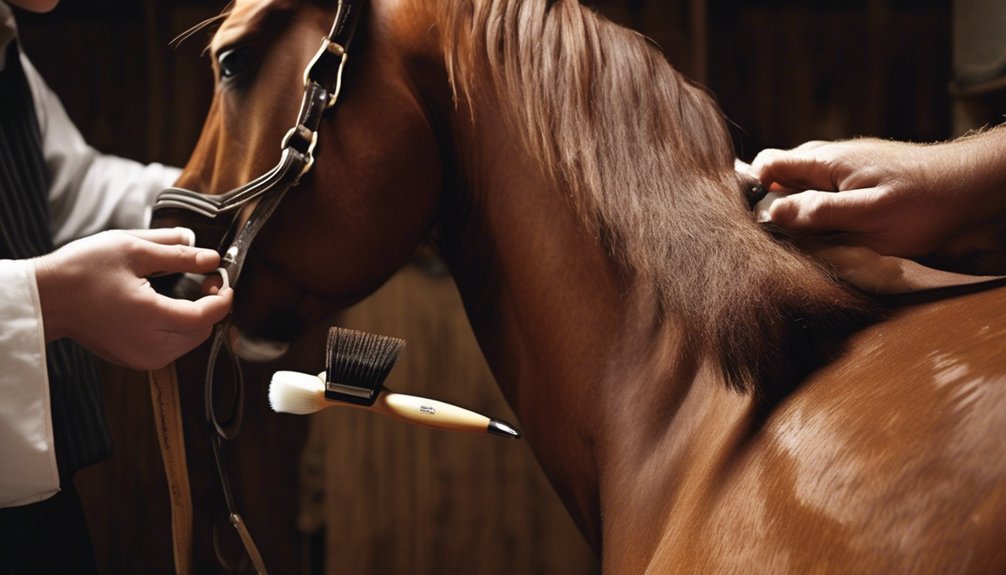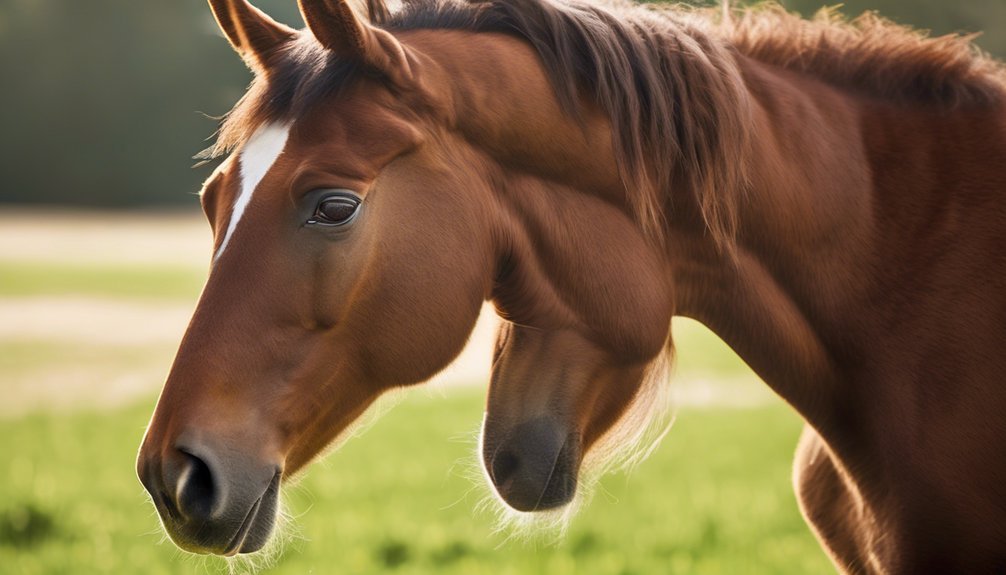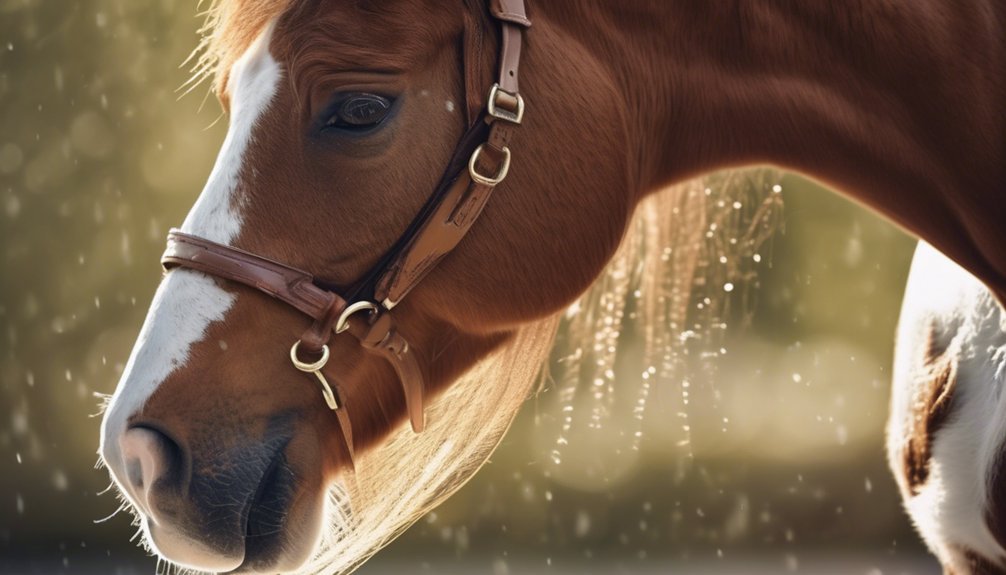
You might think horse dandruff isn't a serious concern, but it can indicate underlying health issues that need attention. Understanding how to prevent and treat this condition is crucial for your horse's overall well-being. By focusing on effective grooming techniques and nutritional support, you can significantly improve skin health. But what specific steps should you take to address both the symptoms and the root causes? Let's explore these essential strategies together.
Key Takeaways
- Maintain a balanced diet rich in essential fatty acids, vitamins, and minerals to promote healthy skin and reduce dandruff formation.
- Regularly groom your horse using appropriate tools, employing gentle techniques to remove flakes and stimulate skin health.
- Monitor environmental conditions, adjusting care routines to address high or low humidity, which can impact skin hydration.
- Use medicated shampoos and topical treatments to address existing dandruff and provide relief from irritation.
- Consider dietary supplements like Omega-3 fatty acids and biotin to enhance skin and coat health.
Understanding the Causes of Horse Dandruff

While you might think of dandruff as a minor issue, understanding its causes in horses is essential for effective management. Dandruff can stem from several factors affecting your horse's skin health.
Dry skin, often caused by environmental conditions or inadequate hydration, is a common culprit. Allergies to feed or bedding can trigger irritation, leading to flaking.
Furthermore, underlying infections or skin parasites might exacerbate the problem, making it crucial to assess your horse's overall condition. Nutritional deficiencies, particularly in fatty acids, can also contribute to poor skin health, resulting in dandruff.
Effective Grooming Techniques
Grooming your horse effectively plays a crucial role in managing dandruff and promoting skin health. Start by selecting appropriate grooming tools, such as a curry comb and a stiff bristle brush.
Use the curry comb in circular motions to loosen dirt and dead skin, then follow with the stiff brush to remove debris. Pay special attention to areas prone to dandruff, like the mane, tail, and along the back. Incorporate gentle brushing techniques; avoid aggressive strokes that might irritate the skin.
Finish with a soft brush to distribute natural oils, enhancing coat shine and overall health. Regular, thorough grooming not only removes dandruff but also strengthens your bond with your horse, fostering a trusting relationship.
Nutritional Considerations for Healthy Skin

Effective grooming helps maintain your horse's coat and skin health, but nutrition also plays a vital role in preventing dandruff and promoting overall skin condition. Providing a balanced diet rich in essential fatty acids, vitamins, and minerals is crucial for skin hydration and resilience. Consider incorporating dietary supplements to enhance nutrient intake.
| Nutrient | Benefits |
|---|---|
| Omega-3 Fatty Acids | Improves skin hydration |
| Biotin | Supports hoof and skin health |
| Zinc | Aids in skin repair |
Environmental Factors and Their Impact
Environmental factors significantly influence your horse's skin health and can exacerbate issues like dandruff.
Humidity levels play a crucial role; high humidity can create a damp environment, promoting fungal infections that lead to skin irritation. Conversely, low humidity can dry out your horse's skin, causing flakiness and discomfort.
Seasonal changes further complicate the situation; winter often brings dry air that strips moisture from the skin, while summer heat can lead to excessive sweating, which may worsen dandruff.
Being mindful of these environmental conditions allows you to create a healthier habitat for your horse.
Regularly monitor the humidity and adjust care routines accordingly to maintain optimal skin health and minimize dandruff-related problems.
Treatment Options for Existing Dandruff

While dandruff in horses can be frustrating, there are several effective treatment options available to help restore your horse's skin health. Begin with careful shampoo selection; choose a medicated shampoo specifically designed for dandruff. This helps cleanse the skin and eliminate flakes.
Incorporate topical treatments like antifungal creams or oils to soothe irritation and promote healing. Regular grooming also plays a vital role in managing dandruff.
| Treatment Type | Description |
|---|---|
| Shampoo Selection | Use medicated shampoos for effective cleansing. |
| Topical Treatments | Apply antifungal creams to soothe and heal. |
| Regular Grooming | Brush regularly to remove flakes and stimulate skin. |
Frequently Asked Questions
Can Horse Dandruff Spread to Other Horses?
Horse dandruff isn't typically contagious, so you won't see dandruff transmission between horses. However, it's essential to monitor for any underlying contagious conditions that might cause similar symptoms, ensuring their overall health and comfort.
How Often Should I Bathe My Horse to Prevent Dandruff?
Imagine your horse's coat glistening like morning dew. To maintain that brilliance and prevent dandruff, bathe your horse every two to four weeks, ensuring consistent coat care while promoting healthy skin and reducing dryness.
Are Certain Horse Breeds More Prone to Dandruff?
Certain horse breeds exhibit unique breed characteristics that can affect skin health, making them more prone to dandruff. Regular grooming and maintaining a balanced diet can help mitigate these issues, ensuring your horse stays healthy.
Does Weather Affect Horse Dandruff Severity?
You might not realize how much weather patterns and humidity levels can influence dandruff severity in horses. Fluctuating conditions can exacerbate skin issues, leading to increased flaking. Keep an eye on the forecast!
Can Stress Contribute to Horse Dandruff Development?
Yes, stress factors can definitely contribute to horse dandruff development. When you prioritize effective horse care, addressing stressors like changes in routine or environment is crucial for maintaining your horse's coat health and overall well-being.
Conclusion
In conclusion, combating horse dandruff demands diligence and determination. By prioritizing proper grooming, providing a balanced diet, and maintaining a suitable environment, you can significantly support your horse's skin health. Don't hesitate to explore effective treatments if dandruff persists. Remember, a proactive approach, paired with professional advice when needed, will pave the path to a healthy, happy horse. Stay vigilant and ensure your equine friend shines with a sleek, sparkling coat!





